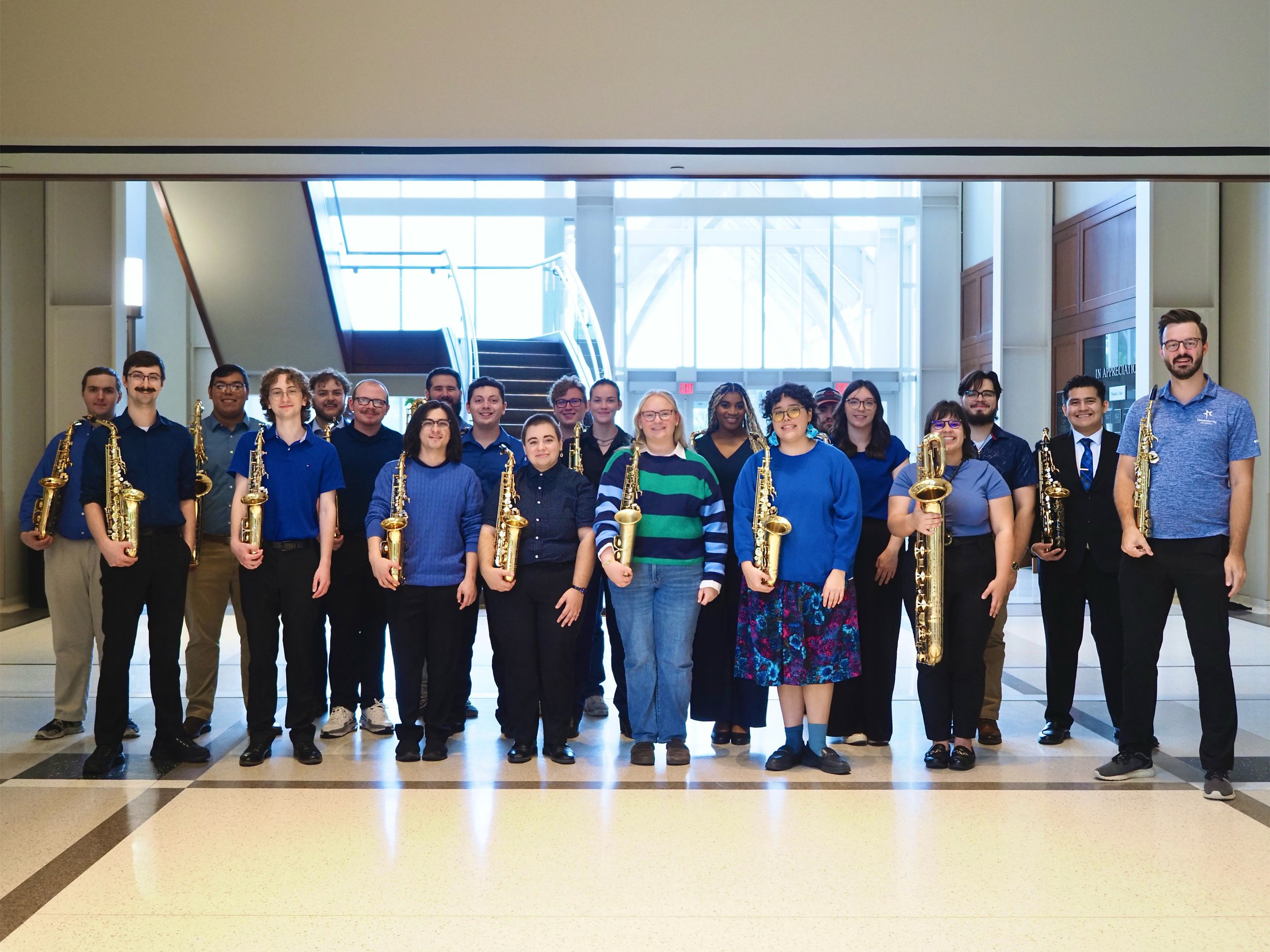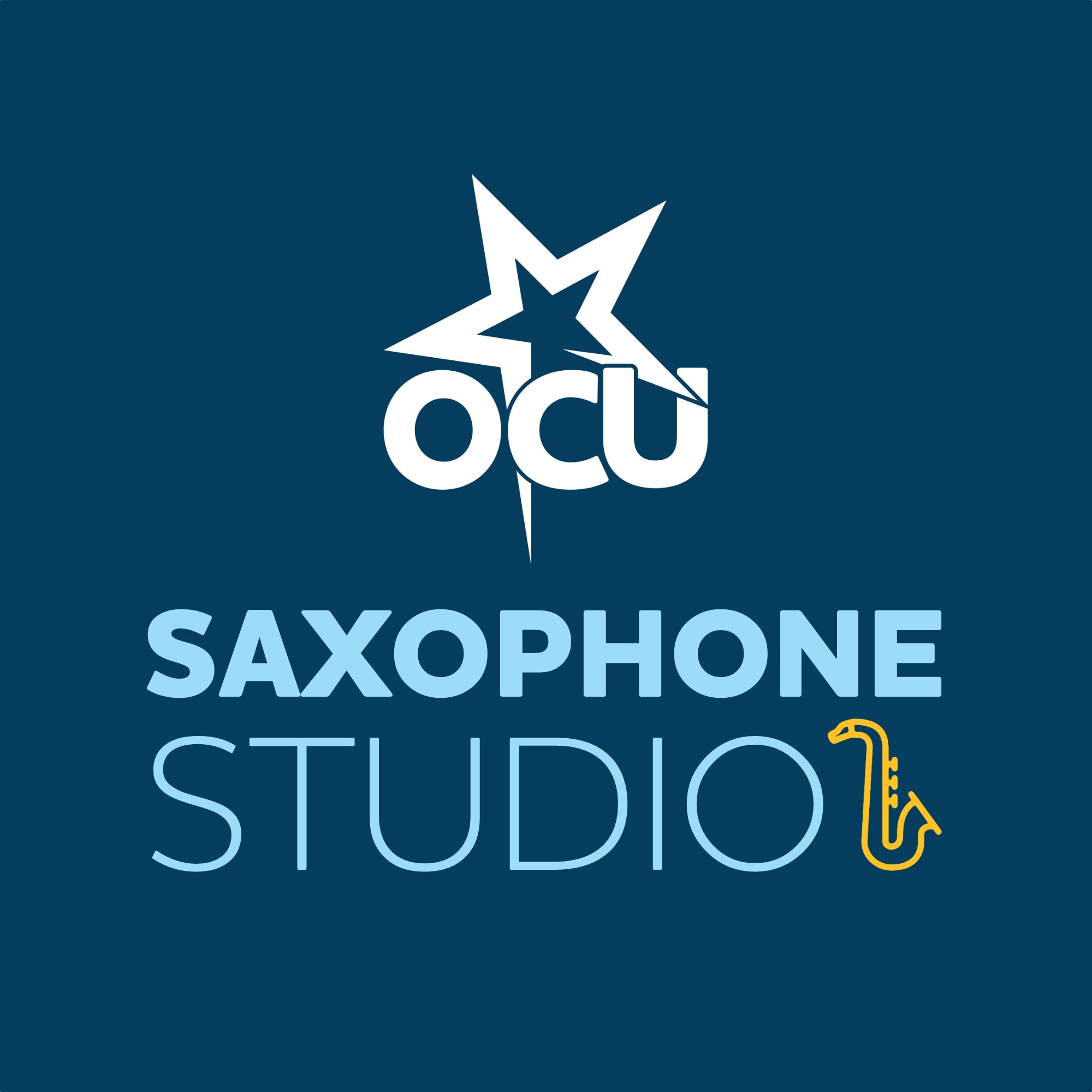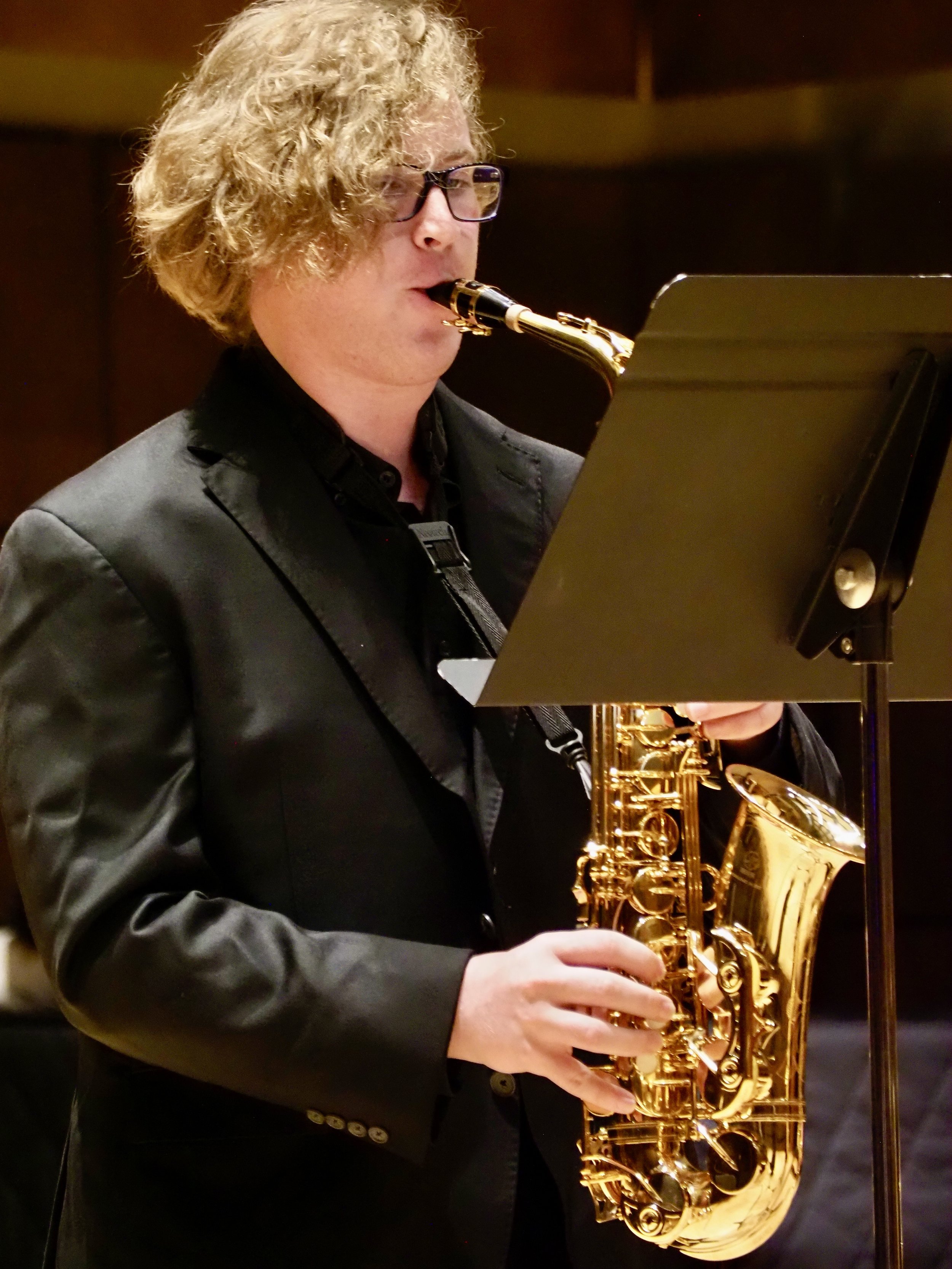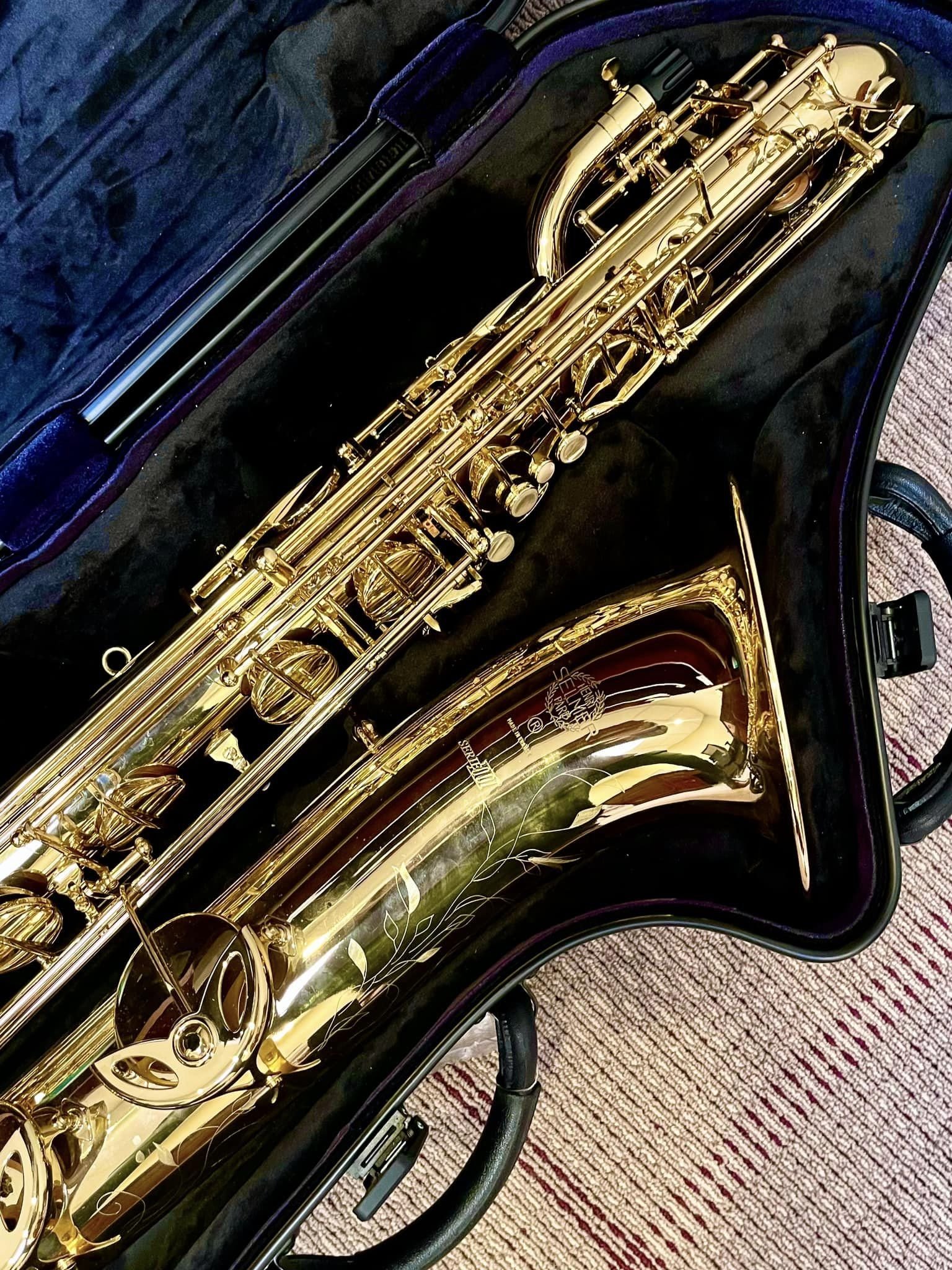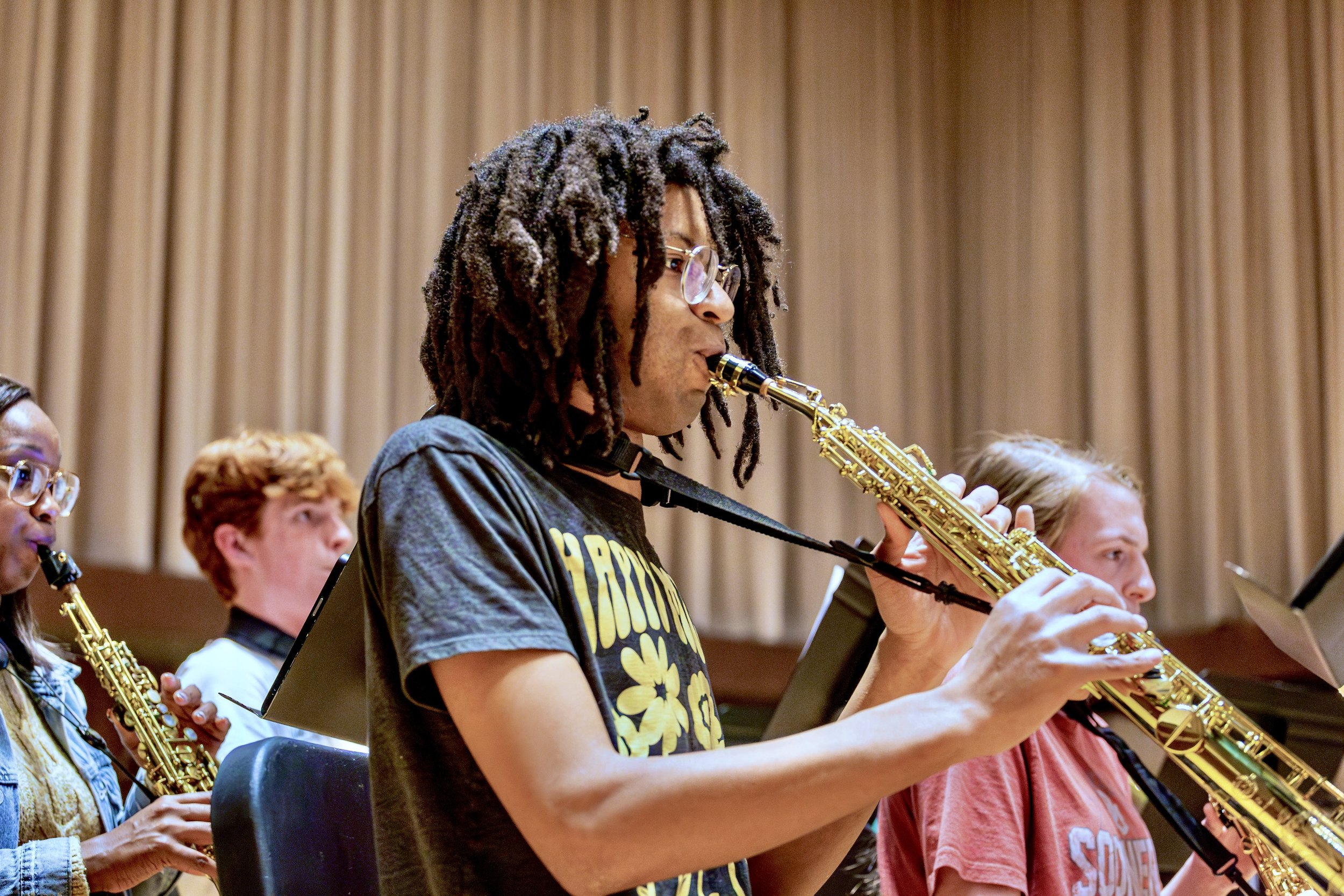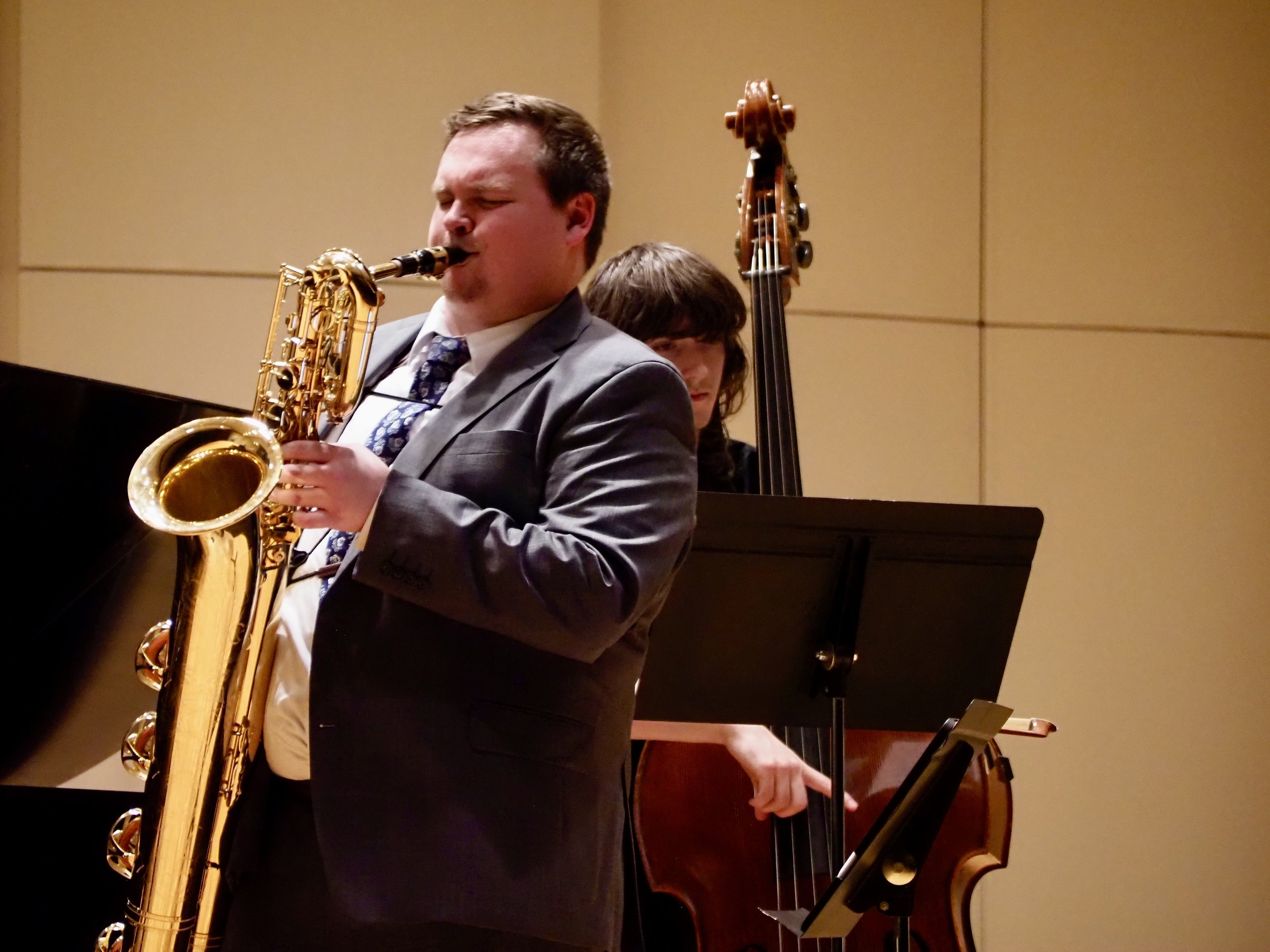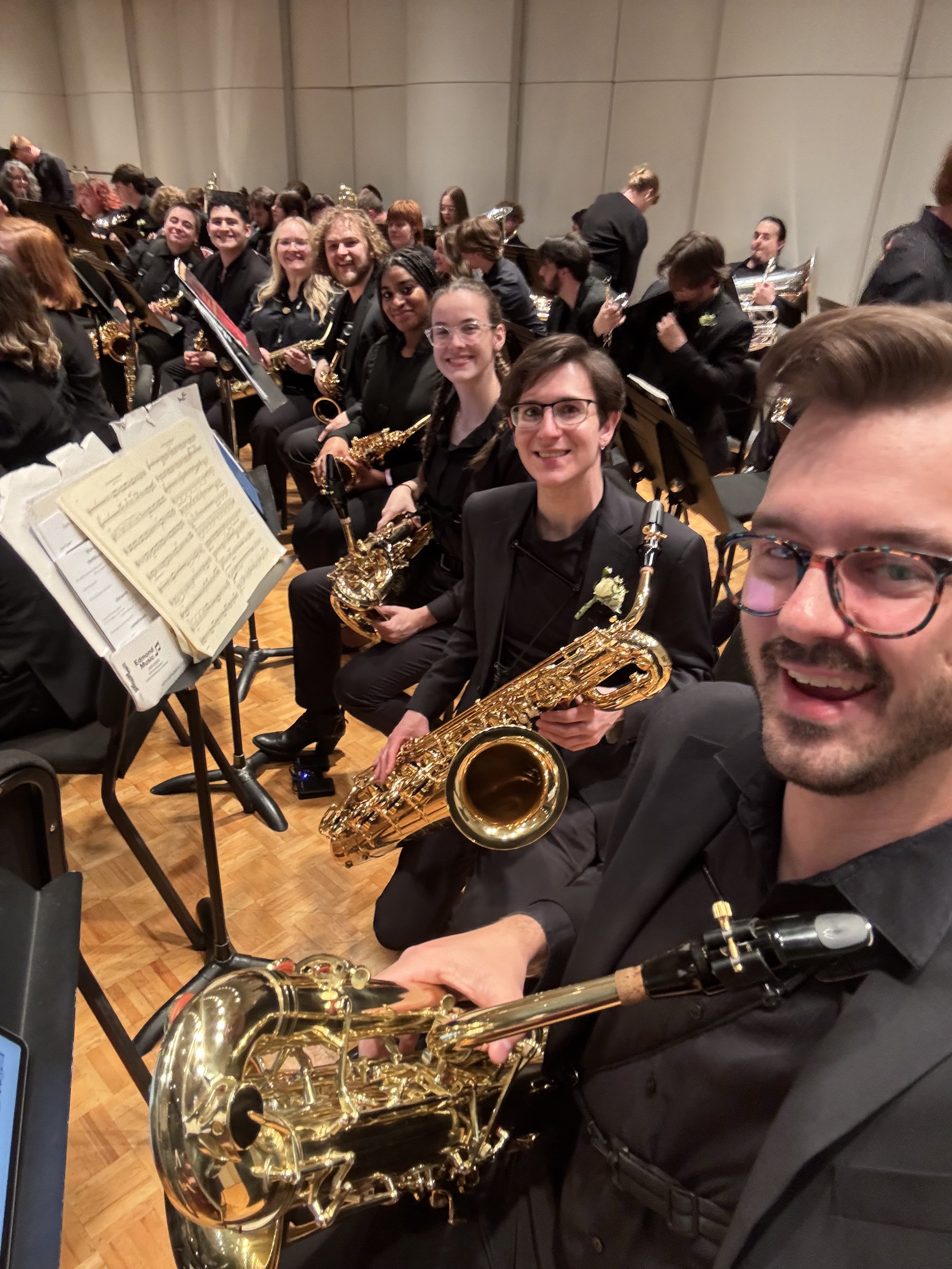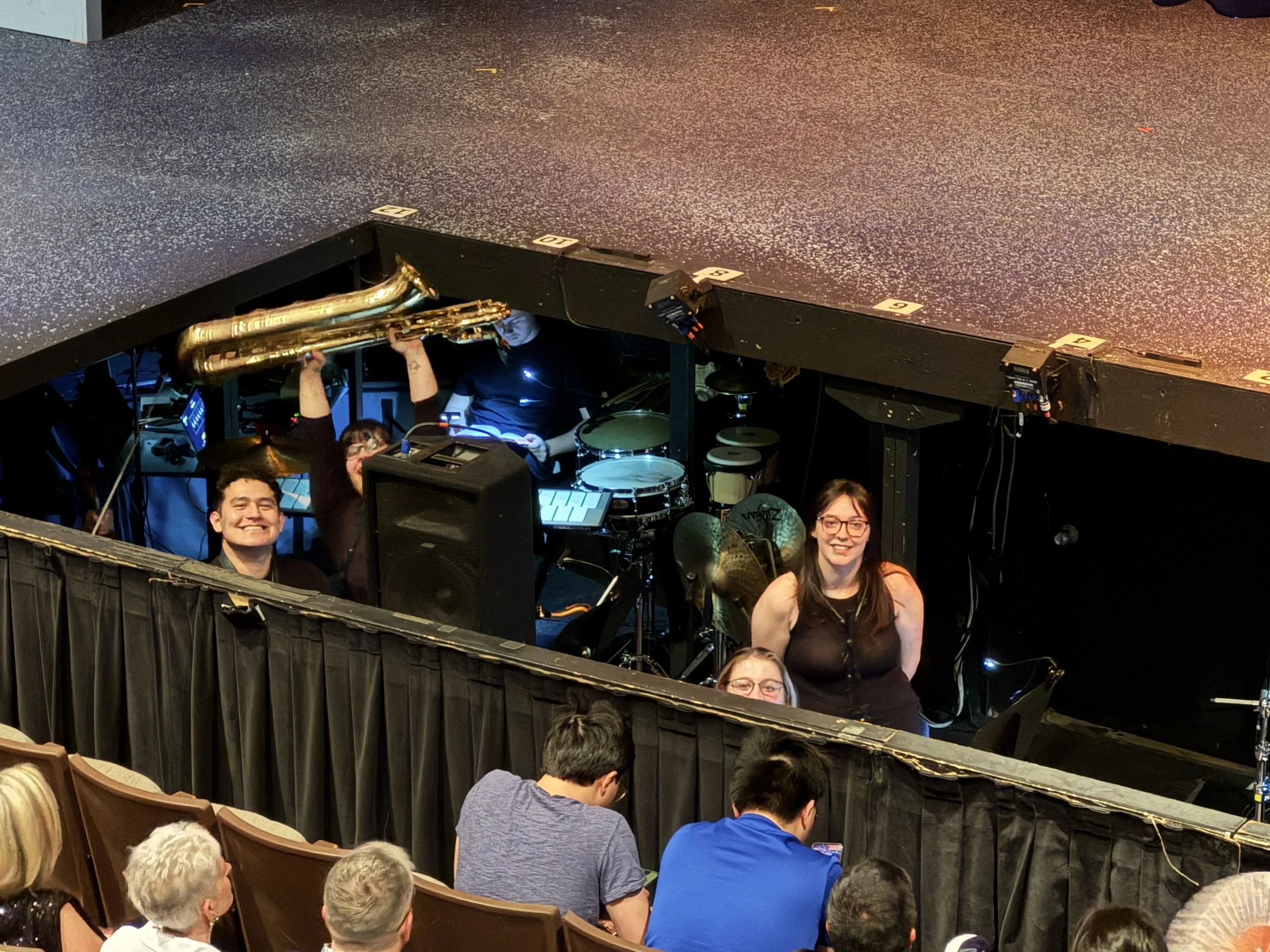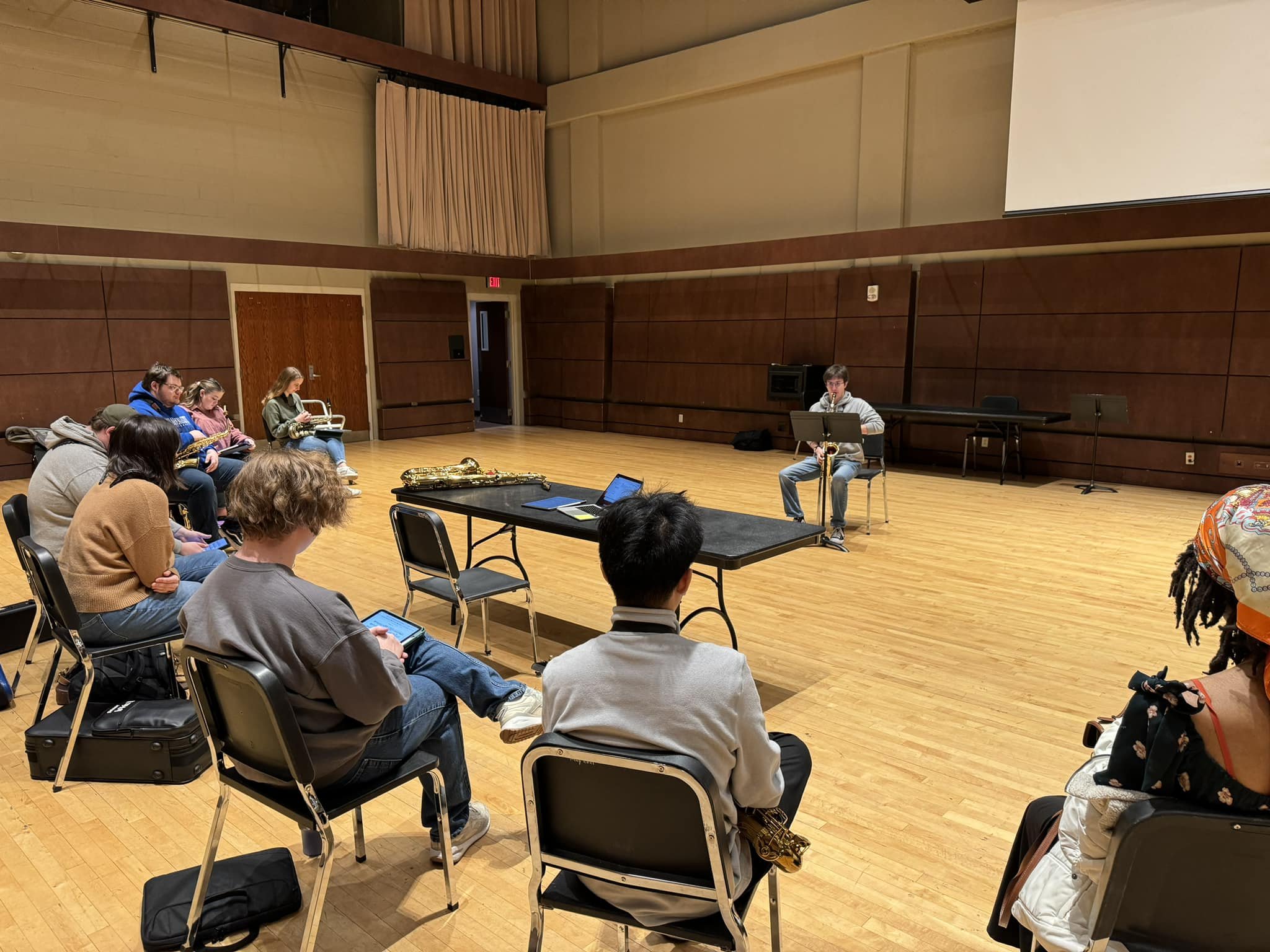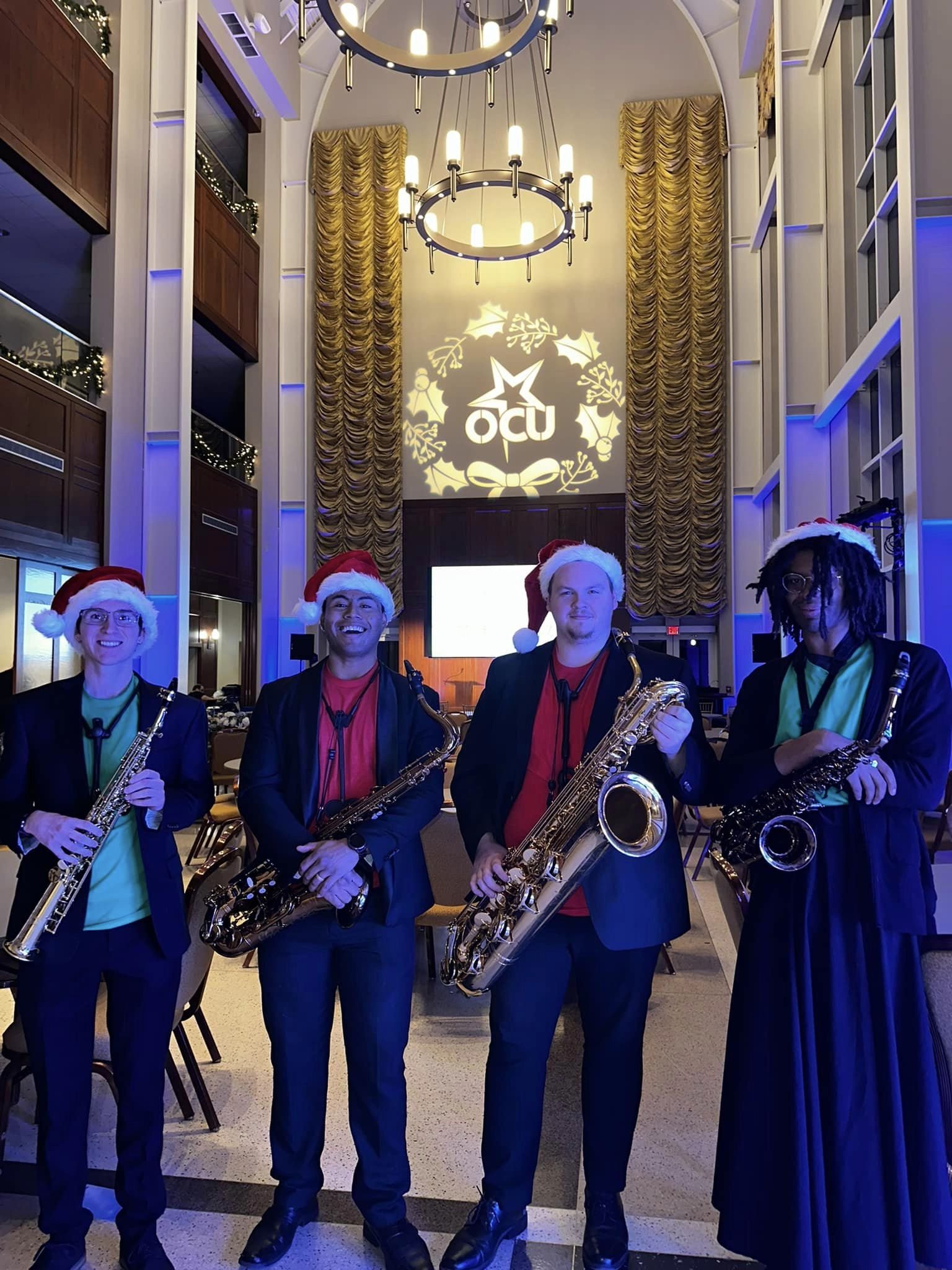Saxophone excellence in the heart of OKC
The Oklahoma City University Saxophone Studio is a vibrant home to talented, hardworking, and high-achieving students of diverse musical backgrounds. Students support each other and create a studio environment with a strong supportive family feel.
Every OCU saxophonist studies with Dr. Heaney for their entire degree – no lessons with a graduate assistant!
Uniquely, the OCU saxophone studio allows ample opportunities for crossover and collaboration. Saxophonists will play classical, jazz, contemporary, and chamber music and frequently engage in secondary areas such as woodwind doubling, vocal ensembles, piano, or composition.
Available Undergraduate Programs:
BM Instrumental Performance
BM Instrumental Music Education
BM Music Composition
BA Music (designed for double majors!)
BA Music + Pre-Law Studies
BA Music + Pre-Med Studies
Non-major scholarship auditions
Available Graduate Programs:
MM Instrumental Performance
MM Multiple Woodwind Performance
MM Music Composition
MM Conducting (wind, orchestral, choral)
Studio Activities & Ensembles:
Saxophone duos, trios, quartets, and saxophone choir
Award-winning OCU Wind Philharmonic & Wind Ensemble
OCU Jazz Orchestra with Vince Norman and jazz combo groups
Composition Studio (Project 21) new music collaborations and premieres
Off-campus performances and teaching gigs
Attend and perform at North American Saxophone Alliance and Navy Band Saxophone Symposium conferences
Masterclasses, coachings, and networking with world-class guest artists, recently including:
Nicki Roman, Gail B. Levinsky, Johnny Salinas, Bob Mintzer, Kenneth Tse, Geoff Landman, John Sampen, Alexis Seah, and Clay Steiner
Annual OCU Saxophone Day (fall)
Oklahoma Saxophone Ensemble (spring)
How do I apply?
-
-
-
Review your specific degree program’s audition requirements, below.
Auditions can incur in person on a variety of audition dates (fall and spring semesters), on alternative dates by appointment, or remotely via video submission on Acceptd.
100% of students admitted to the School of Music receive a music scholarship!
I want to audition! What music should I prepare?
-
Prepare the chromatic scale and major scales, either full-range or all-state style. Applicants will be asked to play a few scale selections in the audition.
Memorization is preferred. Cleanliness, accuracy, and polish are more important than sheer speed!
Prepare two (2) contrasting selections from the following list suggested repertoire. Other non-listed pieces of similar quality and rigor are welcome. I suggest picking a single movement from the solo works and a contrasting etude.
Solo Works:
E. Bozza, Aria
P. Creston, Sonata, Op. 19
H. Eccles (arranged by Sigurd Rascher), Sonata
A. Glazunov, Concerto, Op. 109
B. Heiden, Sonata
A. Jolivet, Fantasie Impromptu
D. Joly, Cantilène et Danse
P. Maurice, Tableaux de Provence
J. Rueff, Chanson et Passepied
J.B. Singelée, Concertino, Op. 57 or Op. 78
H. Villa-Lobos, Fantasia
Etudes:
B. Berbiguier (arranged by Marcel Mule), 18 Exercises
W. Ferling, 48 Famous Studies
D. Hite, Melodious Studies (Book 1 easier, Book 2 more challenging)
S. Rascher, 24 Intermezzi
H. Voxman, Rubank: Selected Studies
All undergraduate applicants will be asked to sight read.
-
Prepare major, harmonic minor, and chromatic scales, full range style. Applicants will be asked to play a few scale selections in their audition.
Memorization is required. Scales will be evaluated for tone quality, polish, and evenness in addition to tempo.
Prepare three (3) works: two (2) contrasting selections from the traditional repertoire as well as one (1) selection from the contemporary repertoire (works written after circa 1980). Overall, approximately 25-30 minutes of music (equivalent to a BM recital) should be programmed. Other non-listed pieces of similar quality and rigor are welcomed.
Traditional Repertoire examples:
R. Boutry, Divertimento
Dahl, Concerto
F. Decruck, Sonate en ut#
A. Desenclos, Prelude, Cadence, et Finale
P.M. Dubois, Concerto
L.E. Larsson, Concerto
I. Gotkovsky, Brillance
K. Husa, Elegie et Rondeau
J. Ibert, Concertino da Camera
H. Tomasi, Concerto
Contemporary Repertoire (after ca. 1980) examples:
W. Albright, Sonata
L. Berio, Sequenza IXb
D. Chang, Two Preludes
C. Dundee, Star Bits
S. Garrop, Tantrum
C. Lauba, Neuf Études
D. Maslanka, Sonata
M. Shrude, Kantada
J. Tower, Wings
T. Yoshimatsu, Fuzzy Bird Sonata
All graduate applicants will be asked to sight read.
What financial aid opportunities are available?
-
The Wanda L. Bass School of Music is proud to offer robust music scholarships for applicants. Music scholarships are awarded based on quality of audition. Oklahoma City University also offers stackable academic scholarships for applicants (GPA 3.0 and higher)
Music scholarships and academic scholarships can stack to cover up to 100% of tuition!
Oklahoma City University annually awards more than $34 million in aid! More info about undergraduate scholarship opportunities can be found here: https://www.okcu.edu/paying-for-ocu/types-of-assistance/first-year-scholarships
Undergraduates may qualify for FAFSA-type grants, need-based aid, federal work study, and student employment with opportunities to work convenient jobs in the Wanda L. Bass School of Music. More info about student employment can be found here: https://www.okcu.edu/current/financial-aid-office/student-employment
-
Classical Saxophone Performance Assistantship
Work with Dr. Heaney with duties as assigned, including directing the Oklahoma Saxophone Ensemble, performing in the graduate saxophone quartet, and assisting with studio logistics and teaching.
Includes a tuition waiver and small stipend. No minimum hours per week, duties are primarily performance-based.
Jazz Saxophone Performance Assistantship
Work with Dr. Heaney with duties as assigned, including performing in the OCU jazz ensemble and leading the section development throughout the year, perform in the graduate saxophone quartet.
Includes a tuition waiver and small stipend. No minimum hours per week, duties are primarily performance-based.
Ensemble Performance Assistantship
Perform in OCU’s large ensembles as assigned, perform in the graduate saxophone quartet, other duties as assigned.
Includes a full tuition waiver. No minimum hours per week, duties are primarily performance-based.
In addition to assistantships, scholarship awards for up to full tuition are available.
Current students are encouraged to take advantage of the School of Music’s Burton Music Competition Fund, which provides support for qualified students traveling to competitions. Additional funding support for projects and other special accomplishments is possible via petition.
Interested in a free trial lesson and campus visit?
Have other questions?
Please send me an email at jheaney@okcu.edu!
About the Wanda L. Bass School of Music
Oklahoma City University’s Wanda L. Bass School of Music is a close-knit community of over 350 students. Creativity, excellence, and opportunity converge in over 250 performances each year, ranging from solo recitals to full-scale choral and orchestral works, as well as six opera and music theater productions. A NASM Accredited All-Steinway School, we offer exceptional faculty, state-of-the-art facilities, and creative resources to prepare artists for vibrant careers in music and education. OCU music alumni excel across the musical spectrum as performers, educators, and composers, with some earning the industry’s highest honors including Grammy, Emmy, and Tony Awards.

